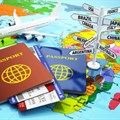The Southern African Development Community (SADC) Business Council Tourism Alliance has voiced strong opposition to Namibia's planned restrictive visa policies. The Alliance warns that these policies could cripple the nation's tourism sector and hinder economic growth.
Namibia recently removed visa-free entry for citizens of 31 countries, most of whom are major tourists. This decision has sparked criticism from tourism and economic groups who fear it will damage Namibia's tourism industry and economic growth. The Economic Policy Research Association (EPRA) urged the Namibian government to talk with these countries instead of imposing visa restrictions.
It says this move by Namibia directly contradicts Namibia Airports Company's recent "Air Connect Namibia" strategy, which aims to attract more international flights and improve overall connectivity. The SADC Business Council Tourism Alliance fears stricter visa requirements will have a negative domino effect, impacting not just tourism but also hospitality, transportation, and retail – all industries that rely heavily on international visitors.
Evidence from across Africa, including success stories from Rwanda and Zambia, demonstrates that visa liberalisation significantly boosts tourism, foreign investment, and overall economic growth.
A more open visa policy, it says, attracts a diverse range of visitors, including business travellers, investors, and tourists, who contribute to the economy through spending, job creation, and tax revenue. The Africa Visa Openness Index 2023 highlights that visa openness is crucial for Africa’s tourism industry, catalysing economic growth.
Negative impact of restrictive visa policies
"A restrictive visa regime can negatively impact the entire tourism value chain," says Natalia Rosa, project lead for the SADC Business Council Tourism Alliance. "It hinders not only leisure travel but also business travel, conferences, events, education, and trade, thereby limiting overall economic growth and development."
Several African countries, including those within the Southern African Development Community (SADC), are moving towards more liberal visa policies. Namibia risks falling behind its regional peers and losing its competitive edge as a tourist destination if it adopts a more restrictive approach.
"We urge the Namibian government to reconsider these restrictive measures and engage in dialogue with stakeholders to find solutions that balance security concerns with the need for economic growth and regional competitiveness," adds Rosa.
"Aligning visa policies with the air access strategy is essential to maximise the benefits of increased flight options and attract a larger influx of travellers. Namibia could look to successful examples like Rwanda, which has seen significant growth in its MICE (Meetings, Incentives, Conferences, and Exhibitions) tourism sector due to visa liberalisation and investment in infrastructure."
Puzzling u-turn on visa policy
One of the first countries to introduce a remote working visa recognising the demand post-Covid, Namibia’s visa regime U-turn is puzzling, particularly as SADC prepares to pilot its Univisa.
Instead of tightening visa restrictions, Namibia could explore alternative solutions such as implementing more efficient visa processing systems (e.g., e-visas), targeted visa waivers for specific groups, or enhanced security measures at borders.
“All barriers to entry for international visitors must be critically examined and addressed to encourage longer stays, increase spending in the economy, and accelerate the recovery of the tourism sector,” Rosa concludes.
The SADC Business Council Tourism Alliance says that it remains committed to supporting Namibia’s tourism industry and advocating for policies that promote sustainable growth and development.










































